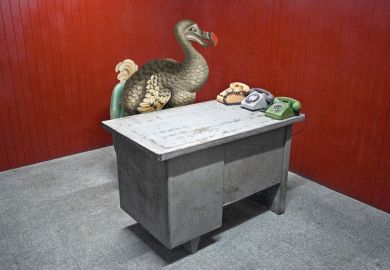The average academic gives away the equivalent of more than three months’ labour every year, with universities’ “workload formulae” ignoring tasks that are crucial to the job, research reveals.
Detailed analyses of the labours of dozens of lecturers and professors have found that they typically deliver almost an hour of overtime for every three hours of paid work.
The findings are based on trials of an “academic workload estimation tool” developed over the past decade by two University of Tasmania academics.
The tool allows academics to log granular details of the tasks expected of them in any given year, including indispensable tasks that are rarely acknowledged in institutional workload models.
“Academic performance management processes…focus on a narrow range of research outcomes and ignore much of the service and other scholarly work academics undertake,” says a paper outlining the tool in the journal Higher Education. “Many time-consuming but necessary activities [are] not accounted for.”
The tool rectifies this by enabling users to tally all activities related to their teaching, research and service roles, with a “credible and evidence-based time value” assigned to each. This “provides a more transparent, holistic and realistic estimate of an individual’s workload”, the paper says.
The estimates included “research activities which most universities don’t quantify at all”, such as preparing ethics and grant applications for ultimately unsuccessful projects.
The tool allocates 16 hours for each ethics application, 50 hours for each peer-reviewed conference paper, 60 hours for each patent application and 120 hours for each journal article submission. It allows two hours’ preparation and delivery time for each teaching delivery hour in “repeat” courses, and up to 11 hours in “totally new” subjects.
Research student supervision absorbs 40 hours a year per student at bachelor’s and master’s levels and 60 hours at doctoral level. Examining a doctoral thesis takes 30 hours, while editing a journal or conference proceedings requires 150 hours. Course coordination consumes 145 hours a year, while directing a “budget centre” takes 825 hours – slightly under half the nominal annual allocation of 1,717 working hours.
These are “median” values, stressed lead author John Kenny, an associate professor of science education. “If you speak to 50 academics [about] how long it takes to do a lecture, you’ll get 50 different answers. We’re not saying it’ll take any given individual that amount of time. We’re saying this is a reasonable amount of time to allocate to that task.”
In a “validation” exercise, 39 academics from 21 Australian universities tried the estimation tool. Most deemed it “more realistic” than their institutional workload models, with 24 participants found to be working at least 10 per cent more than their salaried hours, and 12 battling workloads at least 50 per cent higher.
While 15 participants were found to be working a nominal 38 hours a week, the average across the cohort was just over 50. Twelve averaged 59 hours or more a week, with two averaging 95.
The estimation tool should be adopted as “a standard model across the sector”, the paper says. “We call on university management and the union to take up this challenge and work together to finally get this right.”
Andrew Norton, professor in the practice of higher education policy at the Australian National University, said the autonomous and unpredictable nature of academia made workloads hard to quantify. Some students required more time than others, requests to give media interviews or write book chapters arrived without warning, and research often saw people “bogged down in things you thought were going to be easy”.
“The boss has less visibility of what you’re doing than is normal,” Professor Norton said, adding that it was hard to say whether universities routinely underestimated the time required for academic tasks. “They’ve got incentives to set demanding efficiency levels – it’s a question about whether those are reasonable or not.”
Joanne Cys, provost of the University of South Australia, said she would prefer to have no workload model and just judge staff on their performance.
“It’s not in the nature of academic work to micromanage. You’re typically dealing with pretty intelligent people who organise their own time,” she said.
Professor Cys said her institution had considered establishing an “opt-in” workload model for the few academics who wanted “micrometered measurement” of their activities.
For many academics, she said, the “calling” extended beyond designated hours. “You can’t stop your brain from working. When you’re researching, when you’re thinking about your next workshop or seminar, you don’t stop at 5pm and start again at 9am. It’s always there.”
POSTSCRIPT:
Print headline: Academics ‘give away one-third of their time’
Register to continue
Why register?
- Registration is free and only takes a moment
- Once registered, you can read 3 articles a month
- Sign up for our newsletter
Subscribe
Or subscribe for unlimited access to:
- Unlimited access to news, views, insights & reviews
- Digital editions
- Digital access to THE’s university and college rankings analysis
Already registered or a current subscriber?











